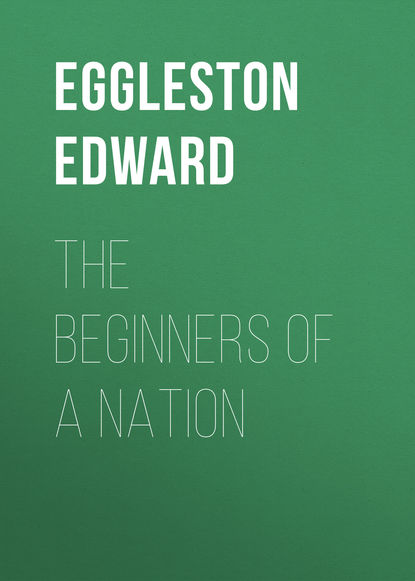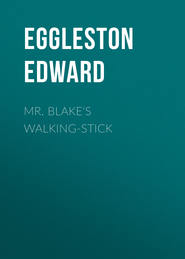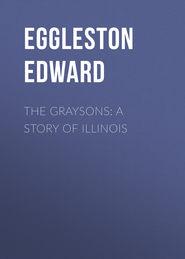По всем вопросам обращайтесь на: info@litportal.ru
(©) 2003-2024.
✖
The Beginners of a Nation
Настройки чтения
Размер шрифта
Высота строк
Поля
Barclay, Inner Life, etc., 410, 411, cites Sebastian Franck's Chronica of 1536, from which it appears that the Seekers in fact if not in name existed about a century before Williams adopted their views. "Some desire to allow Baptism and other ceremonies to remain in abeyance till God gives another command – sends out true laborers into the harvest… Some others agree with those who think the ceremonies since the death of the Apostles, are equally departed, laid waste and fallen – that God no longer heeds them, and also does not desire that they should be longer kept, on which account they will never again be set up but now are to proceed entirely in Spirit and in Truth and now in an outward manner." The relation of Seekerism to Quakerism is manifest. "To be a Seeker is to be of the best Sect next to a finder," wrote Cromwell in 1646.
115
There is a paper on this debate in the British Record Office indorsed by Archbishop Laud, "Rec: Octob: 7. 1637," "Propositions wch have devided Mr. Hooker & Mr. Cotton in Newe England. 1. That a man may prove his justification by his works of sanctification, as the first, best, and only cheife evidence of his salvation. 2. Whither fayth be active or passive in justification. 3. Whither there be any saving preparation in a Christian soule before his unyon with Christ. This latter is only Hooker's opinion, the rest of the ministers do not concurr with him: Cotton and the rest of the contrary opinion are against him and his party in all." Colonial Papers, ix, 71. In the next paper in the same volume, also indorsed by Laud, the controversy is more fully set forth. Copies of both are in the Bancroft collection of the New York Public Library. Laud indorsed these papers respectively October 7 and 15, 1637. The Cambridge Synod, which met August 30th, had adjourned late in September, and the debates which divided the two divines must have preceded it, and perhaps preceded the migration of Hooker to Connecticut in 1636. When Haynes was Governor of Massachusetts he had pronounced the sentence of banishment against Williams. But some years later, while Governor of Connecticut, he relented a little and wrote to Williams: "I think, Mr. Williams, I must now confesse to you, that the most wise God hath provided and cut out this part of his world for a refuge and receptacle for all sorts of consciences. I am now under a cloud, and my brother Hooker, with the bay, as you have been, we have removed from them thus far, and yet they are not satisfied." Quoted by Williams in a letter to Mason, 1st Massachusetts Historical Collections, i, 280.
116
The abstract of Hooker's sermon of May 31, 1638, as deciphered and published by Dr. J. Hammond Trumbull, is in the Collections of the Connecticut Historical Society, i, 20, 21, and the Fundamental Laws of 1639 are in Hinman's Antiquities, 20, and ff., and in Trumbull's Blue Laws, 51. Compare also the remarkable letter of Hooker to Winthrop in Connecticut Historical Society Collections, i, 3-15. Hooker objects strongly to the right of arbitrary decisions by the magistrate: "I must confess, I ever looked at it as a way which leads directly to tyranny, and so to confusion, and must plainly profess, if it was in my liberty, I would choose neither to live nor leave my posterity under such government." This letter exhibits Hooker's intellect to great advantage. One is inclined to rank him above most of his New England contemporaries in clearness and breadth of thought.
117
The selling of half-developed homesteads to newcomers by older settlers was of constant occurrence in all the colonies during the colonial period. It was a notable practice on the frontiers of Pennsylvania down to the Revolution, and perhaps later. Hubbard thus describes what went on in every New England settlement: "Thus the first planters in every township, having the advantage of the first discovery of places, removed themselves into new dwellings, thereby making room for others to succeed them in their old." General History of New England, 155.
118
The existence in England of a doctrine resembling that of the followers of Cotton and Mrs. Hutchinson is implied in Welde's preface to the Short Story of the Rise, Reign, and Ruine of Antinomianism. "And this is the very reason that this kind of doctrine takes so well here in London and other parts of the kingdome, and that you see so many dance after this pipe, running after such and such, crowding the Churches and filling the doores and windowes."
119
Giles Firmin's Review of Davis's Vindication, 1693, quotes from a letter of Shepard of Cambridge, Massachusetts: "Preach Humiliation, labor to possess Men with a Sence of Misery and wrath to come. The Gospel Consolations and Grace which some would have only disht out as the Dainties of the times and set upon the Ministry's Table may possibly tickle and ravish some and do some good to some which are Humbled and Converted already. But if Axes and Wedges be not used withal to hew and break this rough unhewn bold but professing age, I am Confident the Work and Fruit … will be but meer Hypocrisie."
120
Notwithstanding his early imprudence during the partisan excitement in Boston, Whelewright was a man of sound judgment, and his testimony regarding his sister-in-law is the most important we have. "She was a woman of good wit and not onely so, … but naturally of a good judgment too, as appeared in her civill occasions; In spirituals indeed she gave her understanding over into the power of suggestion and immediate dictates, by reason of which she had many strange fancies, and erroneous tenents possest her, especially during her confinement … attended by melancholy." Mercurius Americanus, p. 7.
121
Hugh Peter, after his return to England, adopted the views in favor of toleration beginning to prevail there. Nine years after he had obtruded himself so eagerly to testify against Mrs. Hutchinson, he was writing to New England earnest remonstrances against persecution. 4 Massachusetts Historical Collections, vi, where the letters are given.
122
There were those who wished to give time for a second admonition before excommunication, but they were overruled, probably by Wilson. Winthrop, i, 310. It would, perhaps, have been in better form to take the other and less eager course. There is a Latin paper in the British Public Record Office, dated 3 March, 1635, which professes to give a brief and orderly digest of the canons of government constituted and observed in the reformed New England churches. I am unable to trace its authority. From this I quote; "Qui pertinacitur consistorii admonitiones rejecerit a cœna domini suspendatur. Si suspensus, post iteratus admonitiones nulla pœnitentiæ signum dederit ad excomunicationem procedat Ecclesia."
123
It would be a waste of time to controvert the ingenious apologies which have been written to prove that an inexorable necessity compelled the banishment of the Antinomians. The Massachusetts government was in its very nature and theory opposed to religious toleration, as we may see by the reference of the case of Gorton and his companions to the elders, and their verdict that these men, not residents of the jurisdiction, ought to be put to death for constructive blasphemy, a decision that the magistrates by a majority vote would have put in execution if the "deputies" or representative members of the assembly had not dissented. Savage's Winthrop's Journal, ii, 177. The doctrine of intolerance is ingeniously set forth in Cotton's "The Powring Ovt of the Seven Vials, … very fit and necessary for this Present Age," published in 1642. Cotton compares Jesuits and heretics to wolves, and says, "Is it not an acceptable service to the whole Country to cut off the ravening Wolves?" The Puritans of New England from their very circumstances were slower to accept the doctrine of religious liberty than their coreligionists in England.
115
There is a paper on this debate in the British Record Office indorsed by Archbishop Laud, "Rec: Octob: 7. 1637," "Propositions wch have devided Mr. Hooker & Mr. Cotton in Newe England. 1. That a man may prove his justification by his works of sanctification, as the first, best, and only cheife evidence of his salvation. 2. Whither fayth be active or passive in justification. 3. Whither there be any saving preparation in a Christian soule before his unyon with Christ. This latter is only Hooker's opinion, the rest of the ministers do not concurr with him: Cotton and the rest of the contrary opinion are against him and his party in all." Colonial Papers, ix, 71. In the next paper in the same volume, also indorsed by Laud, the controversy is more fully set forth. Copies of both are in the Bancroft collection of the New York Public Library. Laud indorsed these papers respectively October 7 and 15, 1637. The Cambridge Synod, which met August 30th, had adjourned late in September, and the debates which divided the two divines must have preceded it, and perhaps preceded the migration of Hooker to Connecticut in 1636. When Haynes was Governor of Massachusetts he had pronounced the sentence of banishment against Williams. But some years later, while Governor of Connecticut, he relented a little and wrote to Williams: "I think, Mr. Williams, I must now confesse to you, that the most wise God hath provided and cut out this part of his world for a refuge and receptacle for all sorts of consciences. I am now under a cloud, and my brother Hooker, with the bay, as you have been, we have removed from them thus far, and yet they are not satisfied." Quoted by Williams in a letter to Mason, 1st Massachusetts Historical Collections, i, 280.
116
The abstract of Hooker's sermon of May 31, 1638, as deciphered and published by Dr. J. Hammond Trumbull, is in the Collections of the Connecticut Historical Society, i, 20, 21, and the Fundamental Laws of 1639 are in Hinman's Antiquities, 20, and ff., and in Trumbull's Blue Laws, 51. Compare also the remarkable letter of Hooker to Winthrop in Connecticut Historical Society Collections, i, 3-15. Hooker objects strongly to the right of arbitrary decisions by the magistrate: "I must confess, I ever looked at it as a way which leads directly to tyranny, and so to confusion, and must plainly profess, if it was in my liberty, I would choose neither to live nor leave my posterity under such government." This letter exhibits Hooker's intellect to great advantage. One is inclined to rank him above most of his New England contemporaries in clearness and breadth of thought.
117
The selling of half-developed homesteads to newcomers by older settlers was of constant occurrence in all the colonies during the colonial period. It was a notable practice on the frontiers of Pennsylvania down to the Revolution, and perhaps later. Hubbard thus describes what went on in every New England settlement: "Thus the first planters in every township, having the advantage of the first discovery of places, removed themselves into new dwellings, thereby making room for others to succeed them in their old." General History of New England, 155.
118
The existence in England of a doctrine resembling that of the followers of Cotton and Mrs. Hutchinson is implied in Welde's preface to the Short Story of the Rise, Reign, and Ruine of Antinomianism. "And this is the very reason that this kind of doctrine takes so well here in London and other parts of the kingdome, and that you see so many dance after this pipe, running after such and such, crowding the Churches and filling the doores and windowes."
119
Giles Firmin's Review of Davis's Vindication, 1693, quotes from a letter of Shepard of Cambridge, Massachusetts: "Preach Humiliation, labor to possess Men with a Sence of Misery and wrath to come. The Gospel Consolations and Grace which some would have only disht out as the Dainties of the times and set upon the Ministry's Table may possibly tickle and ravish some and do some good to some which are Humbled and Converted already. But if Axes and Wedges be not used withal to hew and break this rough unhewn bold but professing age, I am Confident the Work and Fruit … will be but meer Hypocrisie."
120
Notwithstanding his early imprudence during the partisan excitement in Boston, Whelewright was a man of sound judgment, and his testimony regarding his sister-in-law is the most important we have. "She was a woman of good wit and not onely so, … but naturally of a good judgment too, as appeared in her civill occasions; In spirituals indeed she gave her understanding over into the power of suggestion and immediate dictates, by reason of which she had many strange fancies, and erroneous tenents possest her, especially during her confinement … attended by melancholy." Mercurius Americanus, p. 7.
121
Hugh Peter, after his return to England, adopted the views in favor of toleration beginning to prevail there. Nine years after he had obtruded himself so eagerly to testify against Mrs. Hutchinson, he was writing to New England earnest remonstrances against persecution. 4 Massachusetts Historical Collections, vi, where the letters are given.
122
There were those who wished to give time for a second admonition before excommunication, but they were overruled, probably by Wilson. Winthrop, i, 310. It would, perhaps, have been in better form to take the other and less eager course. There is a Latin paper in the British Public Record Office, dated 3 March, 1635, which professes to give a brief and orderly digest of the canons of government constituted and observed in the reformed New England churches. I am unable to trace its authority. From this I quote; "Qui pertinacitur consistorii admonitiones rejecerit a cœna domini suspendatur. Si suspensus, post iteratus admonitiones nulla pœnitentiæ signum dederit ad excomunicationem procedat Ecclesia."
123
It would be a waste of time to controvert the ingenious apologies which have been written to prove that an inexorable necessity compelled the banishment of the Antinomians. The Massachusetts government was in its very nature and theory opposed to religious toleration, as we may see by the reference of the case of Gorton and his companions to the elders, and their verdict that these men, not residents of the jurisdiction, ought to be put to death for constructive blasphemy, a decision that the magistrates by a majority vote would have put in execution if the "deputies" or representative members of the assembly had not dissented. Savage's Winthrop's Journal, ii, 177. The doctrine of intolerance is ingeniously set forth in Cotton's "The Powring Ovt of the Seven Vials, … very fit and necessary for this Present Age," published in 1642. Cotton compares Jesuits and heretics to wolves, and says, "Is it not an acceptable service to the whole Country to cut off the ravening Wolves?" The Puritans of New England from their very circumstances were slower to accept the doctrine of religious liberty than their coreligionists in England.








